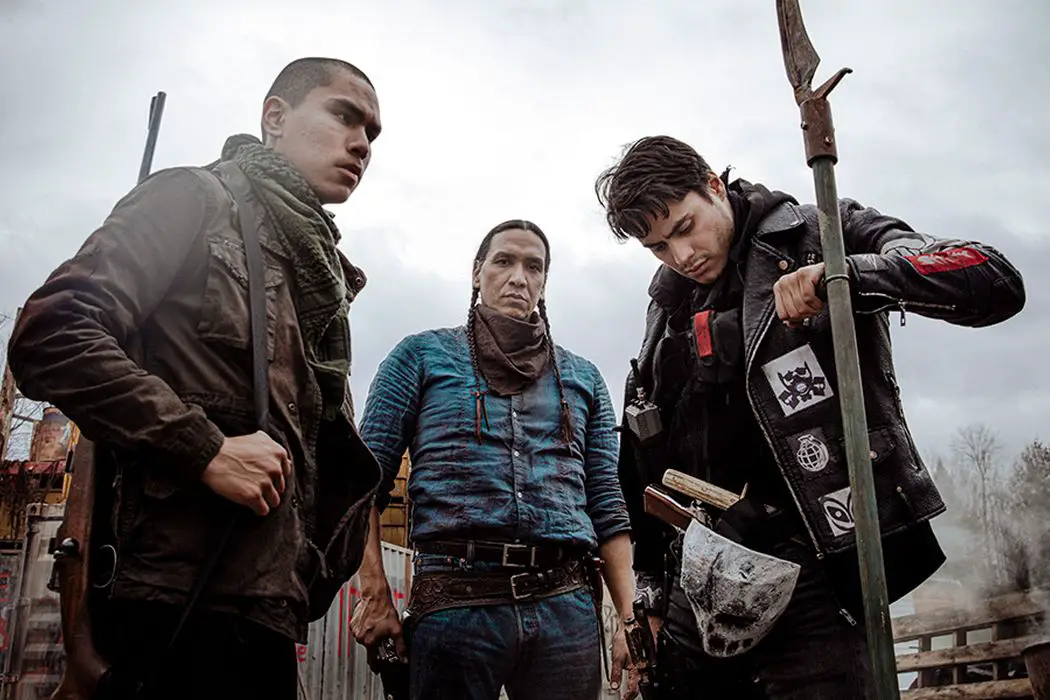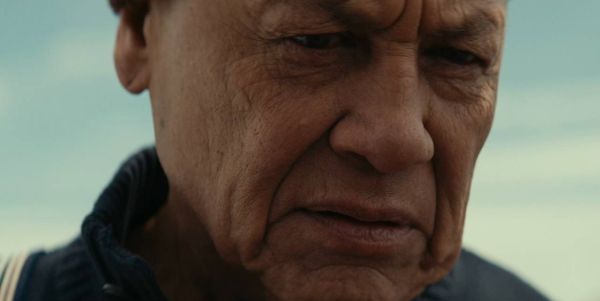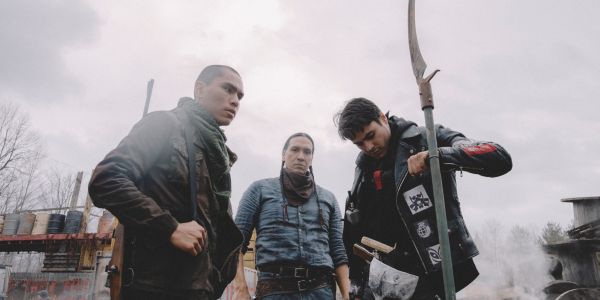TIFF 2019: BLOOD QUANTUM: First Nations vs. Zombie Apocalypse

Wilson is a cinema enthusiast based out of Toronto, Canada.…
As a Canadian, I’m embarrassed to admit that my exposure to Indigenous cinema has been rather limited. Part of this has to do with the relative lack of commercially available Indigenous films at the local multiplexes, but most of it has to do with my own lack of effort in exploring this part of Canadian cinema. Watching Jeff Barnaby’s Blood Quantum wasn’t just a soft nudge to rectify this mistake, it was a deservedly hard kick in the can.
Set in the 1980s, the film revolves around a Mi’gmaq community on the cusp of what appears to be a zombie infestation. And for reasons that are initially not known, being of Indigenous descent somehow renders you immune to the transformative powers of the undead. Fast forward a few months later, these Indigenous survivors bond together to form a safe haven in a ravaged post-apocalyptic world. Michael Greyeyes leads the cast as a disgruntled officer and father, who begrudgingly takes leadership of this newly founded community. On top of defending themselves against flesh eating zombies, the group is also forced to battle the evils that brew within their own ranks as society devolves into a world of hate and darkness. The rest of the surviving community are played by a terrific ensemble of actors, including Elle-Máijá Tailfeathers, Forrest Goodluck, Brandon Oakes and many others.
Bringing Originality and Depth to an Overplayed Genre
Although the zombie genre can seem overplayed at times, Blood Quantum manages to be creative, while somehow also maintaining the genre’s known sensibilities. By embedding Indigenous oppression into the storyline, the film is elevated beyond an action packed thrill ride, that on its own, would have made for a perfectly entertaining piece of cinema. Instead, we get something that’s both entertaining and subversively meaningful.

Similar to other Indigenous communities around the world, Canada has a dark and reprehensible past when it comes to the way that Aboriginal Canadians were treated (and in many instances, are still being treated). Blood Quantum doesn’t necessarily address this on a political level, but it does reference the ongoing mistreatment through the film’s primary narrative device. We learn that the Indigenous community is actually protected from the undead as a result of their blood, which was forgotten by the gods and not blessed in the same way as everyone else’s. This subtext of somehow finding strength in light of being forgotten and ignored, adds depth to a film about survival in an enlightening way.
Layered on top of this is the definition of ‘blood quantum’ itself, which refers to a dated practice of quantifying someone’s Indigenous heredity, a measure that was historically used to determine one’s worth, or lack thereof. Given the new circumstances that these characters find themselves in, the shifting of tides when it comes to power and rank may seem obvious. But in the face of all the brutal violence inflicted by these mindless zombies, the film calls into question whether anything has actually shifted at all. Because at the end of the day, everyone, Indigenous or not, is just trying to survive, and that isn’t so different from their presupposed realities.

During a Q+A session at one of the film’s Toronto International Film Festival (TIFF) screenings, Barnaby also noted the complexities of many paternal relationships in Indigenous communities. The misfortunes of abandonment from father figures are often not that uncommon, and this is certainly reflected in the film. Whether it’s Greyeyes‘ character’s tenuous relationship with his two kids, his stoic relationship with his own father, or the more abstract connection that the Indigenous community has with Mother Earth itself, things are far from simple. The level of social commentary in Blood Quantum is certainly unique for a genre film, and the experience is both rewarding and emotionally charged. More importantly, it really complements the underlying subtext of a post-apocalyptic survival film.
Intentionally Unrefined Violence
The violence in Blood Quantum is also unique in that it’s quite raw and seems almost intentionally unrefined. When the blood spews, it looks real and feels earned, but not in the usual style of glamour and perfection that we tend to see in mainstream studio films. This certainly adds to the film’s 1980s aesthetics, but on top of that, also creates an environment that feels distinctly surreal and primal. The violence almost feels more gratifying because it’s imperfectly shot, at least in cinematic terms. And in some ways, this almost makes it easier to shift away from the sheer commercial aspects of the film and focus more on its elaborate social commentary.
Despite this, the film still deserves its spot on the Midnight Madness lineup at TIFF as it has its fair share of gut wrenching imagery during its runtime. There were roars of excitement from the audience during its screening, and the film also features a number of scenes that should certainly crown Stonehorse Lone Goeman as one of the most badass grandpas ever depicted on screen.
One of the best things about attending film festivals, especially one like TIFF, is the opportunity to discover new cinemas and filmmakers. Even though access to Indigenous films isn’t barred by any means in Canada, and really just takes a bit more effort than catching the latest blockbuster at your local multiplex theatre, Blood Quantum was a real source of discovery for me. I’m hopeful that the film will serve as a source of discovery for cinephiles everywhere, especially after its scheduled wide release in 2020.
Watch Blood Quantum
Does content like this matter to you?
Become a Member and support film journalism. Unlock access to all of Film Inquiry`s great articles. Join a community of like-minded readers who are passionate about cinema - get access to our private members Network, give back to independent filmmakers, and more.
Wilson is a cinema enthusiast based out of Toronto, Canada. He escapes from his day job by writing random thoughts about cinema on the internet. Although he has a longstanding penchant for Hong Kong cinema, he considers himself to be an advocate for Asian cinema in general. He has been attending the Toronto International Film Festival every year since 2005, and more of his work can be found on his website: www.wilson-kwong.com.













